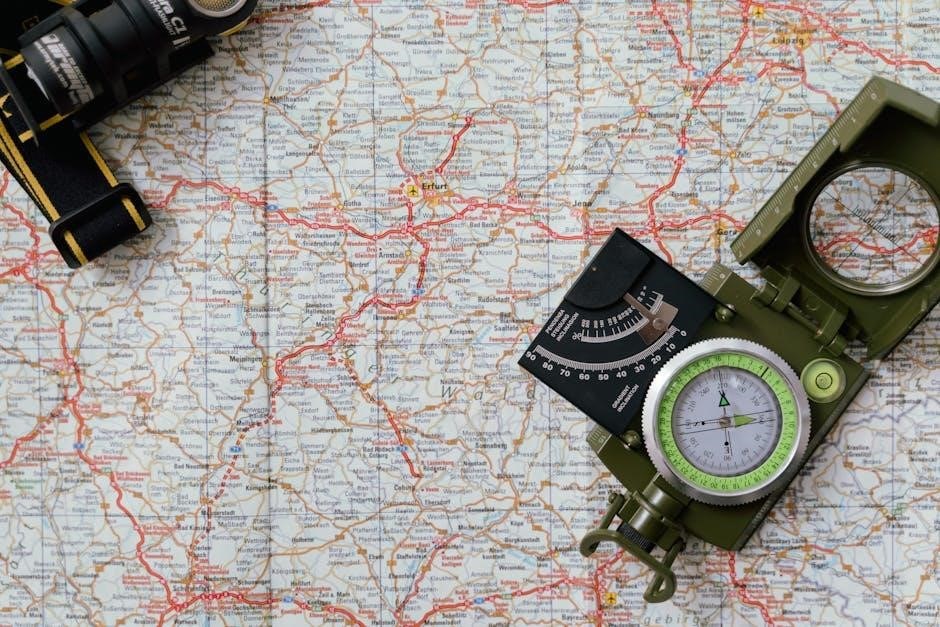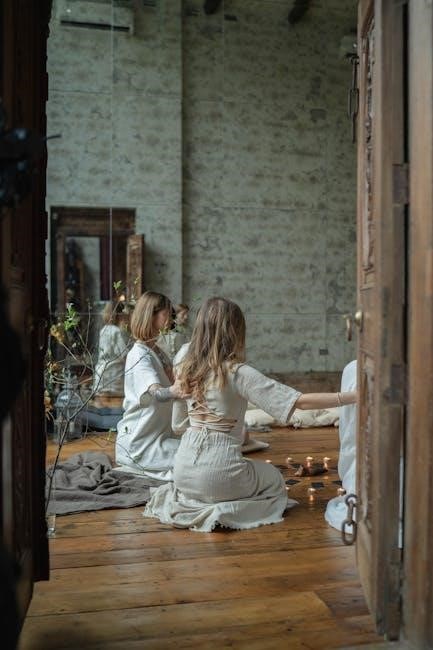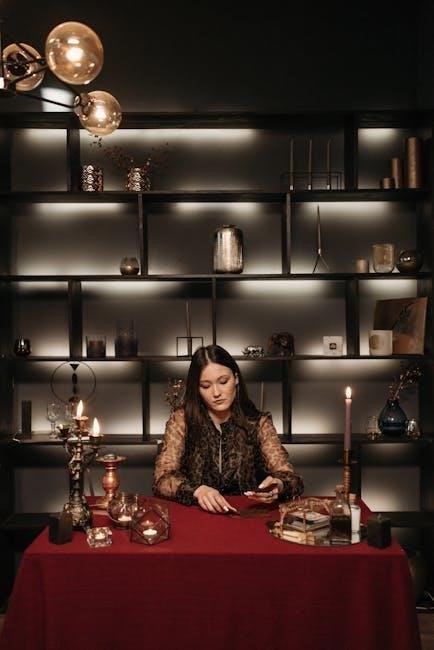Discover the Psychic class in Pathfinder 2e, an occult spellcaster using cantrips and focus points for versatile play․ This guide covers features, builds, and strategies for mastery․
1․1 Overview of the Psychic Class in Pathfinder 2e
The Psychic is a versatile occult spellcaster introduced in the Dark Archive, blending mental discipline with supernatural abilities․ They wield cantrips amplified by Focus Points and utilize two minds: the Conscious Mind for spellcasting and the Subconscious Mind for unique abilities․ This duality offers flexibility in combat and exploration, making the Psychic a dynamic choice for players seeking strategic depth and adaptability in their gameplay․
1․2 Importance of Psychic Class Features and Builds
Psychic class features and builds are crucial for maximizing versatility and impact․ The Conscious Mind and Subconscious Mind provide unique abilities, while cantrips and Focus Points offer flexibility in combat․ Strategic selection of feats and archetypes enhances adaptability, making the Psychic a powerful and dynamic character․ Proper optimization ensures effective play, while subpar choices can limit potential, emphasizing the need for thoughtful build planning and feature selection․

Key Psychic Class Features
Psychic class features include the Conscious Mind, Subconscious Mind, and powerful Class Feats, each offering unique abilities and strategic depth to shape your character’s playstyle and effectiveness in the game․
2․1 Conscious Mind and Its Role in Spellcasting
The Conscious Mind determines the Psychic’s spellcasting abilities, focusing on cantrips and their amplification․ Selecting strong cantrips is crucial, as poor choices can hinder effectiveness․ The Conscious Mind influences how cantrips scale and interact with spells, making it vital for optimizing gameplay and ensuring versatility in both combat and utility scenarios․
2․2 Subconscious Mind and Its Strategic Use
The Subconscious Mind serves as the Psychic’s innate casting benefit, tied to their Intelligence․ It enhances psychic abilities, allowing for strategic spellcasting without depleting resources․ This feature enables complex playstyles, making the Subconscious Mind a cornerstone of the Psychic’s adaptability and power in both combat and utility-focused builds․
2․3 Class Feats and Their Impact on Gameplay
Class Feats empower the Psychic with unique abilities, enhancing spellcasting or unlocking new tactics․ Feats like Ancestral Mind or Adapted Cantrip allow for greater versatility, enabling the Psychic to customize their playstyle․ These feats are pivotal for optimizing builds, whether focusing on offensive power or utility, and they often synergize with the Psychic’s core mechanics to create a balanced and strategic character․

Psychic Spellcasting Mechanics
Psychic spellcasting revolves around cantrips automatically heightened to match character level, focus points to amplify effects, and strategic use of spell slots for efficient gameplay․
3․1 Cantrips and Their Amplification (Amps)
Cantrips form the cornerstone of a Psychic’s arsenal, with automatic heightening based on character level․ Amplification (Amps) enhances these cantrips, adding powerful effects without depleting spell slots․ This system allows for consistent damage and utility, making cantrips a reliable and versatile tool in combat․ Proper selection and amplification of cantrips are crucial for optimizing Psychic effectiveness in various scenarios․
3․2 Spell Slots and Focus Points Usage
Spell slots are limited but crucial for casting higher-level spells, while focus points fuel cantrip amplifications․ Managing these resources strategically is key to maximizing versatility․ Psychics rely more on focus points for consistent damage and utility, making efficient use of both systems essential for effective play in various combat and exploration scenarios․
3․3 Heightened Spells and Their Scaling
Heightened spells in Pathfinder 2e allow psychics to scale their magic without learning new spells․ As the psychic levels up, their cantrips automatically heighten, matching their highest spell slot level․ This system ensures spells remain relevant at higher levels, offering flexibility and potency without requiring extensive relearning, making it a cornerstone of the psychic’s spellcasting efficiency and versatility in both combat and exploration․

Choosing the Right Ancestry for Your Psychic
Selecting the right ancestry for your Psychic is crucial, as it influences their abilities and playstyle․ Ancestry feats can enhance psychic powers, ensuring optimal character performance․
4․1 Ancestry Feats That Synergize with Psychic Abilities
Ancestry feats can significantly enhance your Psychic’s capabilities․ For example, Humans gain Adapted Cantrip, allowing early access to powerful cantrips, while Dwarves benefit from Resilient, boosting saving throws; Elves and Gnomes gain feats like Ancestral Longevity and Logical Mind, improving skill versatility․ Choose ancestries that complement your Psychic’s focus, such as Halfling’s Lucky for crit success in spellcasting․
4․2 Recommended Ancestries for Psychic Builds
Humans are ideal for versatility, offering early access to key feats․ Dwarves provide resilience, boosting saving throws․ Elves excel with cantrip-focused builds, while Gnomes enhance intelligence․ Halflings gain lucky breaks in spellcasting, and Half-Orcs deliver potent critical hits․ Choose ancestries that align with your Psychic’s playstyle, leveraging their unique traits for optimal performance in both combat and utility roles․

Optimizing Psychic Builds
Optimizing your Psychic build involves selecting feats that enhance your playstyle and considering multiclassing for added versatility․ Focus on cantrips with strong amplifications and manage Focus Points wisely to maintain effectiveness in various scenarios․
5․1 Selecting the Best Feats for Your Playstyle
Selecting the right feats is crucial for maximizing your Psychic’s potential․ Focus on feats that enhance cantrip versatility, such as Adapted Cantrip, or those that amplify spellcasting abilities․ Consider feats that synergize with your Conscious Mind or Subconscious Mind, and prioritize those that improve Focus Point efficiency․ Choose feats that align with your desired playstyle, whether it’s dealing damage, controlling battles, or providing support․
5․2 Multiclassing Options for Psychic Characters
Multiclassing can enhance your Psychic’s abilities by combining with classes like Wizard or Sorcerer for spellcasting synergy․ Wizard adds versitility with arcane spells, while Sorcerer boosts charisma for better cantrip scaling․ Champion or Rogue offer martial or skill-based flexibility․ However, focus on classes that complement your Psychic’s core features, ensuring feats and abilities synergize without overlapping․ A well-chosen multiclass can elevate your character’s effectiveness in both combat and exploration․

Advanced Tactics and Strategies
Master cantrip optimization, focus point management, and spell combination techniques․ Learn to sustain spells, control encounters, and adapt strategies for maximum effectiveness in both combat and exploration․
6․1 Using Cantrips Effectively in Combat
Psychics rely heavily on cantrips, which can be amplified using focus points․ Choose cantrips like Electric Arc for versatility, and use them to harass enemies or control the battlefield․ Opt for cantrips with utility, such as Psychic Fist, to adapt to different combat scenarios․ Mastering cantrip usage ensures consistent damage and flexibility without depleting spell slots․
6․2 Managing Focus Points and Spell Slots
Psychics must balance focus points and spell slots for optimal performance․ Reserve spell slots for critical moments, while using focus points to amplify cantrips․ Prioritize spells like Heightened Spells for scalability․ Efficiently manage resources to maintain a mix of offense and utility, ensuring you can adapt to any combat situation without running out of essential abilities during key encounters․

Psychic Archetypes and Subclasses
Explore the Psychic’s diverse archetypes, such as the Subconscious Mind and its variants, offering unique playstyles․ Discover popular archetypes that enhance psychic abilities, adding depth to your character․
7․1 Exploring Subconscious Minds and Their Variants
The Subconscious Mind is a core aspect of the Psychic class, defining their casting style․ Variants like the Logical Mind or Emotional Mind offer unique abilities and playstyles․ Each variant tailors the Psychic’s strengths, from precision casting to emotional manipulation․ Exploring these subclasses reveals diverse strategic options, allowing players to craft a Psychic that fits their preferred gameplay approach and story background․
7․2 Popular Archetypes for Psychic Characters
Psychic archetypes expand the class’s versatility․ The Seer excels at divination, while the Shadow Psychic master manipulates darkness and illusions․ Others, like the Phantom or Mindblade, blend psychic powers with martial prowess or ethereal connections․ Each archetype offers unique abilities, allowing players to craft characters that fit their preferred narrative and combat style, enhancing the Psychic’s already robust occult capabilities․

Equipment and Magic Items for Psychics
Psychics benefit from gear enhancing mental clarity and occult focus․ Headbands boosting Intelligence and mindshield crystals protect against mental effects․ Wands and staves amplify spellcasting, while bags of holding and cloaks of resistance offer utility․
8․1 Essential Gear for Psychic Characters
Psychics rely on gear that enhances mental acuity and spellcasting efficiency․ Headbands boosting Intelligence and mindshield crystals protect against mental effects․ Wands and staves amplify spellcasting, while bags of holding and cloaks of resistance offer utility․ Spell component pouches and focus items like crystals or tarot cards are also crucial for maintaining spellcasting consistency and flexibility in various scenarios․
8․2 Magic Items That Enhance Psychic Abilities
Magic items like headbands of vast intelligence and mindshield crystals enhance psychic powers․ Wands and staves amplify spellcasting, while bags of holding and cloaks of resistance provide utility․ Spell component pouches and focus items like crystals or tarot cards are essential for maintaining spellcasting consistency and flexibility in various combat and exploration scenarios․

Psychic Playstyle Variations
Psychic playstyles range from combat-focused dealers of psychic damage to support-focused utility casters․ Versatility allows players to tailor their approach, whether dominating the battlefield or enabling allies through strategic buffs and debuffs․
9․1 Combat-Focused Psychics
Combat-focused psychics excel in dealing direct damage and controlling the battlefield․ They rely heavily on amped cantrips like electric arc and psychic lance for consistent damage output․ By leveraging heightened spells and strategic use of focus points, these psychics can dominate encounters, making them a formidable presence in any party composition․ Their build often prioritizes Intelligence and spellcasting efficiency to maximize their offensive capabilities․
9․2 Support and Utility Psychics
Support and utility psychics focus on enhancing allies and controlling the battlefield․ They utilize spells like synesthesia for crowd control and hideous laughter to incapacitate foes․ By leveraging cantrips with amps and strategic use of focus points, these psychics provide invaluable utility, making them indispensable for party coordination and tactical advantage in complex encounters․

Common Mistakes to Avoid
Common mistakes for Psychic players include poor cantrip selection, inefficient focus point management, and neglecting subclass synergies․ Avoid these pitfalls to maximize your character’s effectiveness in gameplay․
10․1 Pitfalls in Psychic Class Feature Selection
Poor cantrip selection and inefficient focus point management are common mistakes․ Neglecting subclass synergies and overlooking heightened spells can limit effectiveness․ Avoid choosing feats that don’t align with your build or playstyle, as this can lead to suboptimal performance․ Always prioritize features that enhance your primary abilities and ensure a balanced approach to spellcasting and combat strategies․
10․2 Avoiding Suboptimal Feat Choices
Suboptimal feat choices can weaken your psychic’s effectiveness․ Avoid selecting feats that don’t synergize with your build or playstyle․ For example, taking a combat-focused feat for a support-oriented psychic is inefficient․ Always prioritize feats that enhance your primary abilities or address weaknesses․ Ensure your choices align with your subclass and focus on maximizing either spellcasting, utility, or survivability to maintain a well-rounded character․
Mastering the Psychic class requires balancing cantrips, amps, and feats․ Experiment with builds, adapt to challenges, and embrace the flexibility of occult spellcasting for a unique playstyle․
11․1 Summarizing the Key Takeaways
Pathfinder 2e’s Psychic excels through cantrips, focus points, and strategic feat choices․ Balancing spellcasting with subconscious mind abilities is crucial․ Optimize builds by selecting feats that enhance your playstyle, manage resources wisely, and adapt to challenges․ Experiment with multiclassing and equipment to maximize effectiveness․ Embrace the class’s flexibility and unique occult mechanics to create a powerful, versatile character tailored to your preferred role in the party․
11․2 Encouragement to Experiment and Adapt
Pathfinder 2e’s Psychic offers immense flexibility, encouraging creativity in builds and strategies․ Experiment with different cantrips, feats, and subclasses to find your perfect playstyle․ Adaptability is key—learn from each session and adjust your approach․ Embrace the freedom to craft a unique character that evolves with your experiences, ensuring every adventure is fresh and exciting․ The Psychic’s versatility is your greatest tool!
